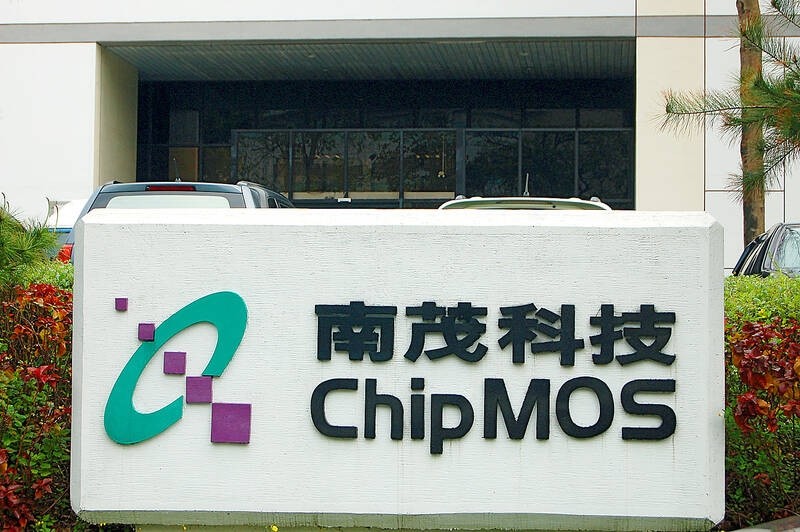Chip packaging and testing service provider ChipMOS Technologies Inc (南茂科技) yesterday gave a muted revenue outlook for the second half of this year as customers became conservative amid US tariff uncertainty and diminishing front-loading demand.
“We are continuing to monitor whether the front-loading demand in the first and second quarters would affect the momentum in the second half of this year,” ChipMOS chairman Cheng Chih-chieh (鄭世杰) told a teleconference.
Cheng did not directly respond to an investor’s question about the likelihood of revenue reduction in the second half of the year. Three months ago, the company said it expected a better second half than the first.

Photo: Grace Hung, Taipei Times
ChipMOS usually posts stronger revenue in the second half of a year, compared with the first half, following the electronics sector’s seasonal patterns.
“The whole supply chain is monitoring the subsequent developments after the 90-day pause of the US [“reciprocal”] tariffs ends. As customers tend to take a conservative approach, it is difficult to have a clear view about the industry’s situation,” Cheng said.
ChipMOS reported that net profit last quarter plunged 60 percent to NT$176.3 million (US$5.79 million) from NT$437.8 million a year earlier, and down 24 percent from NT$232.2 million the previous quarter.
Gross margin dropped to 9.4 percent, compared with 14.2 percent a year earlier and 9.5 percent the previous quarter, while earnings per share were NT$0.24, down from NT$0.6 in the same period last year and NT$0.32 in the previous quarter.
However, revenue grew 2 percent to NT$5.53 billion from NT$5.42 billion a year earlier, up 2.5 percent from NT$5.4 billion the previous quarter, thanks to rush orders from customers, the company said.
The company expects the memorychip segment to have better growth momentum than display driver ICs this quarter and in the second half, attributable to a rebound in DRAM prices and increasing demand for flash memory chips used in artificial intelligence devices, Cheng said.
The visibility for display driver ICs would be vague, he said.
ChipMOS would focus on boosting its factory utilization rate this quarter, after the rate improved slightly to 62 percent last quarter from 59 percent the previous quarter, he said.
The company would also cautiously budget its capital spending for this year to better control the subsequent depreciation costs, Cheng said.
Last year, the company allocated NT$5.45 billion for capital expenditures, with depreciation costs topping NT$4.86 billion.
The company’s board of directors approved a new share buyback program to prop up its share prices. It plans to repurchase 15 million common shares for three months through July 13.

MARKET LEADERSHIP: Investors are flocking to Nvidia, drawn by the company’s long-term fundamntals, dominant position in the AI sector, and pricing and margin power Two years after Nvidia Corp made history by becoming the first chipmaker to achieve a US$1 trillion market capitalization, an even more remarkable milestone is within its grasp: becoming the first company to reach US$4 trillion. After the emergence of China’s DeepSeek (深度求索) sent the stock plunging earlier this year and stoked concerns that outlays on artificial intelligence (AI) infrastructure were set to slow, Nvidia shares have rallied back to a record. The company’s biggest customers remain full steam ahead on spending, much of which is flowing to its computing systems. Microsoft Corp, Meta Platforms Inc, Amazon.com Inc and Alphabet Inc are

Luxury fashion powerhouse Prada SpA has acknowledged the ancient Indian roots of its new sandal design after the debut of the open-toe footwear sparked a furor among Indian artisans and politicians thousands of miles from the catwalk in Italy. Images from Prada’s fashion show in Milan last weekend showed models wearing leather sandals with a braided design that resembled handmade Kolhapuri slippers with designs dating back to the 12th century. A wave of criticism in the media and from lawmakers followed over the Italian brand’s lack of public acknowledgement of the Indian sandal design, which is named after a city in the

INVESTOR RESILIENCE? An analyst said that despite near-term pressures, foreign investors tend to view NT dollar strength as a positive signal for valuation multiples Morgan Stanley has flagged a potential 10 percent revenue decline for Taiwan’s tech hardware sector this year, as a sharp appreciation of the New Taiwan dollar begins to dent the earnings power of major exporters. In what appears to be the first such warning from a major foreign brokerage, the US investment bank said the currency’s strength — fueled by foreign capital inflows and expectations of US interest rate cuts — is compressing profit margins for manufacturers with heavy exposure to US dollar-denominated revenues. The local currency has surged about 10 percent against the greenback over the past quarter and yesterday breached

The US overtaking China as Taiwan’s top export destination could boost industrial development and wage growth, given the US is a high-income economy, an economist said yesterday. However, Taiwan still needs to diversify its export markets due to the unpredictability of US President Donald Trump’s administration, said Chiou Jiunn-rong (邱俊榮), an economics professor at National Central University. Taiwan’s exports soared to a record US$51.74 billion last month, driven by strong demand for artificial intelligence (AI) products and continued orders, with information and communication technology (ICT) and audio/video products leading all sectors. The US reclaimed its position as Taiwan’s top export market, accounting for